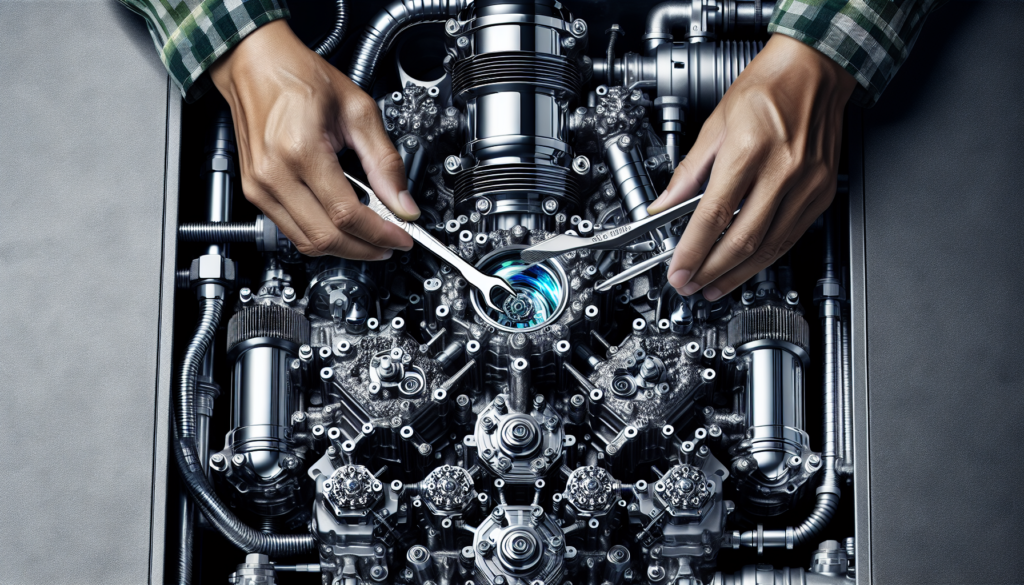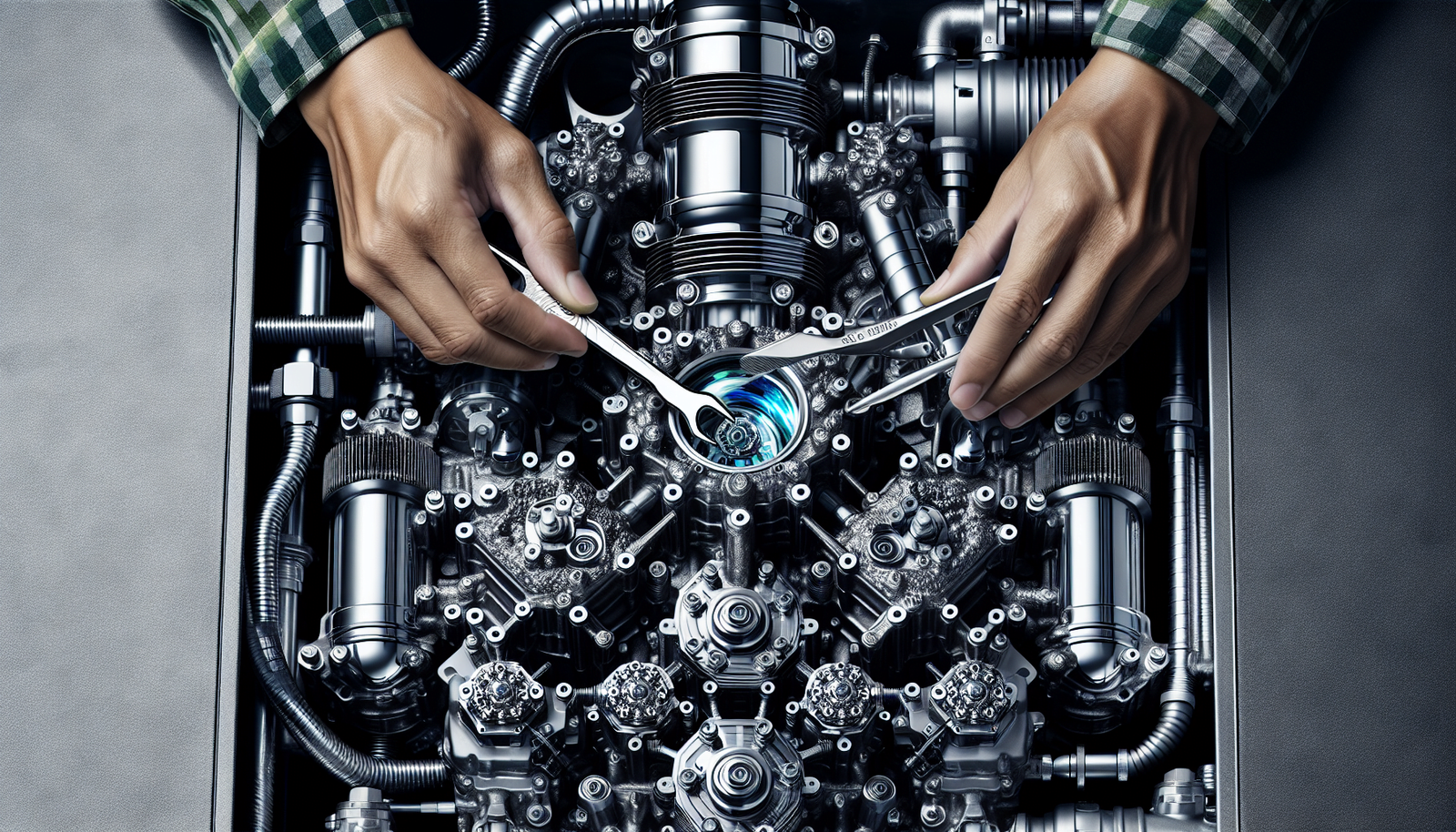If you are among the many boat owners who enjoy spending their time on the water, then you need to familiarize yourself with the common pitfalls when it comes to boat engine maintenance. In the article, “Top 10 Boat Engine Maintenance Mistakes to Avoid”, the delicate art of maintaining your boat’s engine is explored thoroughly. Prepare to learn about the frequent mistakes boat owners make, from undervaluing regular check-ups to mishandling the cooling system. Even the experienced mariner might discover a misstep they’ve been making unknowingly. With these helpful insights, you’ll be able to avoid common blunders and keep your boat running smoothly for many beautiful days at sea ahead.

Ignoring Routine Maintenance
One of the most common boat engine maintenance mistakes you might be making is ignoring Routine maintenance. Routine maintenance is integral for maintaining the optimal function and longevity of your boat’s engine.
Not scheduling regular check-ups
Just like you need regular check-ups to keep your health in check, your boat’s engine requires the same care. Regular inspections help in the early identification of wear and tear or any other operational problems that your boat engine might be facing.
Overlooking simple tasks
The devil is in the details, they say, and when it comes to boat engines, it’s true. Simple tasks such as checking oil levels, inspecting for leaks, or even just cleaning the engine can help ensure that your boat’s engine stays in tip-top shape.
Skipping oil changes
You know how your car doesn’t run smoothly if you don’t change its oil routinely? The same holds true for your boat engine. Regular oil changes are necessary for ensuring that your boat’s engine continues running smoothly and doesn’t face unforeseen damage.
Using Incorrect Engine Oil
Using the incorrect engine oil is another major boat engine maintenance mistake that you might be making.
Selection of oil not suitable for marine engine
A common mistake is to use auto engine oil for your boat engine. Marine engine oil is specially formulated for marine engines and using the wrong oil can lead to reduced performance and damage.
Not considering viscosity ratings of the oil
Not all engine oils are created equal. Each has its viscosity rating that determines how well the oil will flow in specific temperatures. Using an engine oil with the wrong viscosity rating can hamper your boat engine’s functionality in different weather conditions.
Ignoring manufacturer’s recommendation
Every boat engine manufacturer has a specific recommendation for the type of engine oil to be used. Ignoring this recommendation might be inviting unnecessary problems for your boat’s engine.
Neglecting Fuel System
Neglecting the fuel system can have severe repercussions on the functionality and longevity of your boat’s engine.
Failing to treat fuel
Fuel treatment is necessary to prevent the formation of ethanol-based gunk in the carburator or fuel injectors that can hamper engine performance. Failing to treat fuel can lead to unnecessary damage to your boat engine.
Not cleaning fuel filters
A clean fuel filter ensures that only clean fuel reaches your boat’s engine. Unclean fuel can lead to internal damage to the engine components.
Ignoring regular system inspections
Regular inspections of the fuel system can help to identify any potential issues before they turn into major problems. This can save you a lot of time, effort, and money in the long run.

Failing to Winterize the Engine
If you stay in a region that experiences freezing temperatures, not winterizing your boat’s engine can lead to significant damage.
Avoiding winterization process entirely
Think of winterization as putting your boat’s engine to sleep for the winter. It includes a series of processes such as flushing the engine with antifreeze, running the engine to distribute stabilized fuel through the system, and removing the battery. Avoiding this process can lead to engine damage due to freezing temperatures.
Lack of fuel stabilizer use
During the winterization process, a fuel stabilizer is used to prevent any fuel in the system from degrading over the winter. Lack of its use can lead to gummy deposits in the fuel system, hindering the engine performance when you start using your boat again.
Not protecting pipes and lines in freezing weather
Your boat’s engine lines and pipes need extra protection in freezing weather. Not doing so can lead to cracked pipes and leaks which can damage your engine and cost you unnecessary repair expenses.
Improper Boat Engine Storage
The way you store your boat engine during periods of non-use can significantly impact its functionality and longevity.
Keeping engine without care for a long period
Leaving your boat engine without proper care for extended periods can result in various problems like corrosion, leaks, and battery discharge.
Exposing engine to harsh environmental conditions
Exposing your boat’s engine to harsh environmental conditions like intense sunshine, rain, or snow can lead to damage.
Not considering proper ventilation of storage space
Like any space, your boat’s engine storage space needs proper ventilation. Lack of ventilation can lead to humidity build-up, potentially damaging your boat’s engine over time.
Overlooking Coolant System
The coolant system plays an essential role in your boat’s engine, and neglecting it can lead to severe problems, including engine overheating.
Not frequently changing coolant
Regular coolant changes are necessary to keep your boat’s engine cool and running smoothly. Over time, the coolant loses its efficacy and needs to be replaced.
Ignoring to flush the system
Flushing the coolant system helps in getting rid of any accumulated dirt or debris that can clog the system and lead to overheating. Ignoring to flush the system regularly can cause potential damage to your engine.
Avoiding inspection of hoses and pumps
Avoiding regular inspection of the coolant hoses and pumps can lead to unforeseen leaks and failure in your coolant system. Regular inspections ensure that the coolant system is functioning correctly and that any problems are identified and addressed early.
Ignoring Warning Signs
Your boat’s engine will give you signs if something is not right. Ignoring these warning signs can result in significant damage and costly repairs.
Ignoring signs of overheating or irregular noises
Overheating and irregular noises are the most common signs of potential problems in your boat’s engine. Ignoring these signs can lead to engine failure.
Failing to identify oil or coolant leaks
Regular inspections of your boat’s engine can help in identifying any potential oil or coolant leaks. Failing to do so can result in engine damage due to insufficient oil or coolant.
Not paying attention to performance issues
Performance issues such as decreased speed, increased fuel consumption, or engine stall can be indicative of underlying problems. Not paying attention to these issues can lead to more significant problems if not addressed in time.
Underestimating the Importance of Spark Plugs
The health of your boat’s engine is directly linked to the health of its spark plugs. Underestimating their importance and maintenance can harm your engine.
Not replacing spark plugs as required
Spark plugs wear out over time and need to be replaced as required. Not doing so can lead to misfires, decreased performance, and potentially engine damage.
Using incorrect or poor quality spark plugs
Incorrect or poor quality spark plugs can damage your engine and decrease its overall performance. It is crucial to use the correct spark plugs and of a good quality for your boat’s engine.
Ignoring symptoms of spark plug failure
Misfires, hard starting, or reduced performance can be signs of spark plug failure. Ignoring these symptoms might lead to unnecessary damage to your engine.
Lack of Ventilation System Maintenance
A ventilation system is essential for maintaining the health and performance of your boat’s engine. Neglecting the maintenance of this system can lead to significant problems.
Ignoring the importance of proper engine ventilation
Improper ventilation can lead to moisture build-up, which can damage your engine. Therefore, it is important not to ignore the importance of a properly functioning ventilation system.
Not cleaning and inspecting ventilation system regularly
Just like any system, your boat’s ventilation system also requires regular cleaning and inspection. Failure to do so can result in its failure, leading to potential engine damage.
Overlooking signs of ventilation system issues
Signs of ventilation system issues include moisture build-up, a stale smell, or increased engine temperature. Overlooking these signs might lead to significant damage to your boat’s engine.
Improper Use of Cleaning Agents
While cleaning is essential for your boat’s engine health, improper use of cleaning agents can lead to significant damage.
Using harsh cleaners on the engine
Harsh cleaning agents can corrode the engine components. Hence, it is imperative to use only the recommended, less abrasive cleaners on your boat’s engine.
Not thoroughly rinsing after applying cleaners
Failure to thoroughly rinse your boat’s engine after applying cleaners can leave behind residue that can potentially corrode your engine parts.
Ignoring the potential corrosion due to cleaning agents
If not used and rinsed correctly, cleaning agents can lead to potential corrosion in your engine. Therefore, it is important not to ignore the potential corrosion due to improper use of cleaning agents.
By avoiding these common boat engine maintenance mistakes, you can ensure the longevity and optimal functionality of your boat’s engine. So, remember, prevention is better than cure!

